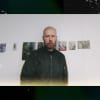Right now, the background on my phone is the cover of Vivien Goldman’s Dirty Washing EP, because it is the thing I listen to more than anything else. Goldman is now a professor at NYU, but for much of the '80s she was a musician and music journalist. Dirty Washing is her only release under her own name. It's a brief collection of psychedelic, experimental dub music. It came out on the now defunct 99 Records—a label that personifies a specific era of New York so perfectly, of course it had to flame out.
The 99 Records story is complicated and murky. You can read about it here, and if that piques your interest, I recommend tracking down a copy of Tuba Frenzy #4, which features an incredible oral history of the label.
In addition to Goldman's record, 99 was also responsible for exposing the world to the layered guitar beauty of Glenn Branca's Lesson No. 1, the primal forward movement of Liquid Liquid and the minimal funk of ESG. (Hearing "UFO" for the first time ranks up there for me with the first time I heard Goldman's "Private Armies (Dub)," also the first time I heard Liquid Liquid's "Optimo," also the first time I heard Raekwon rap over "UFO" much, much later—the point is, though 99 Records only existed for a short window of time, its impact was massive.) Because of the way the label sort of just...stopped, a lot of this material is out of print, or reissued in unsavory bootleg form. Luckily, we have the internet, so all of it is worth tracking down, especially if you're looking to get a handle on New York's borderless musical history at a time when digital dancehall and early hip-hop bumped up against white kids experimenting with dub and mutant disco. In a lot of ways, what 99 Records represents now is as powerful as the sparse catalog it left in the world.
Forest Swords, aka Matt Barnes, is from Wirral, in the north of England. He started making music long after 99 Records was defunct. When Scott Wright interviewed Barnes in 2009 for this site, he helpfully included a slideshow of Wirral. It went a long way toward explaining how the environment you live in impacts the music you make. Though he's pretty far removed (in time and in geographical distance) to the 99 Records scene, aesthetically he fits right in. Barnes makes music that uses repetition as a launching point for meditative explorations of rhythm. On 2010's Dagger Paths, he created a series of tracks that drifted and echoed, that curled up into themselves and then slowly unfolded again. They ended when they ended, and they were worth living in. Barnes made music that sounded cool as much as it sounded sad or therapeutic. His output is unfortunately (or fortunately, depending on how you want to look at it) minimal. It's luckily worth endless listens, endless re-examinations, endless re-contextualizing.
After a long period of silence, he released "Thor's Stone" yesterday. Like his previous material, it deliberately creates layers of rhythmic nots, piling on top of themselves in a mess of rusty creaks and clangs. It is, loosely, dub music—as much as Vivien Goldman made dub, anyway. It's hard not to put the two next to each other in my mind: both have a frustratingly limited catalog, and both seem to be meticulous about the way they release music. Both use dub's basic structure as a launchpad for endless experimentation. To call "Thor's Stone" dub wouldn't be quite right, but it wouldn't be off-base either. It exists in that sweet spot of musical influence between everything and nothing.
The beauty of dub music is that the structure is rigid enough that you can't just sort of claim that you make dub music and have people believe you, or slot your music into that world while still pushing forward sonically. It's not that what Forest Swords does is without precedent—it's just that it feels exactly right as it is. Like he's touching on something familiar, just to the left of what we know.

